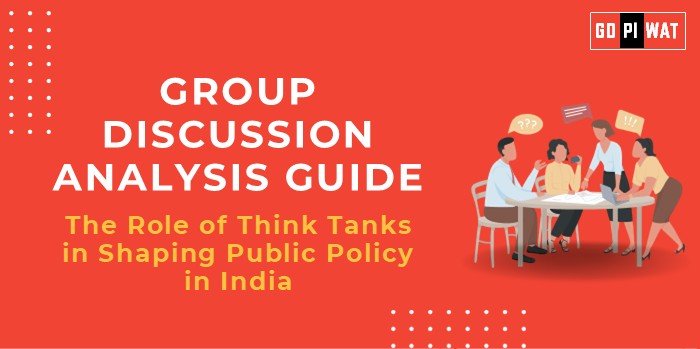📋 Group Discussion Analysis Guide
🌐 The Role of Think Tanks in Shaping Public Policy in India
🧠 Introduction to the Role of Think Tanks
Opening Context: Think tanks are pivotal in shaping public policy by providing research-based insights and fostering informed debates. In India, they address a spectrum of issues, including economics, governance, and technology.
Topic Background: The evolution of think tanks in India dates back to the pre-independence era, with institutions like the Gokhale Institute of Politics and Economics established in 1930. Post-independence, their role expanded, contributing significantly to nation-building and policy formulation.
📊 Quick Facts and Key Statistics
- Global Ranking: India hosts the third-largest number of think tanks globally, with 612 institutions as of 2020.
- Influential Institutions: The Observer Research Foundation (ORF) was ranked 27th among global think tanks in 2019, reflecting its significant impact.
- Policy Influence: Think tanks like the Centre for Policy Research (CPR) and the Institute for Defence Studies and Analyses (IDSA) have shaped key policies in national security and economic reforms.
👥 Stakeholders and Their Roles
- Government: Engages with think tanks for evidence-based policy recommendations and strategic insights.
- Private Sector: Collaborates with think tanks on research projects, providing funding and practical perspectives.
- Academia: Contributes scholarly expertise and research methodologies, enhancing the analytical rigor of think tanks.
- Civil Society: Benefits from policy advocacy and awareness initiatives, influencing public opinion and grassroots movements.
🏆 Achievements and Challenges
Achievements
- Policy Development: Think tanks have contributed to frameworks like the Goods and Services Tax (GST) and the National Education Policy (NEP).
- International Recognition: Institutions like the Council on Energy, Environment and Water (CEEW) are ranked among top global think tanks.
- Crisis Management: Provided critical analyses and policy suggestions during the COVID-19 pandemic.
Challenges
- Funding Constraints: Financial limitations affect research capabilities and independence.
- Regulatory Hurdles: Compliance with the Foreign Contribution Regulation Act (FCRA) limits access to international funding.
- Urban Bias: Many think tanks are urban-centric, neglecting rural and marginalized communities.
Global Comparisons
- United States: Institutions like the Brookings Institution set benchmarks for policy research with significant independence.
- China: State-affiliated think tanks play a strategic role in centralized policy formulation.
Case Studies
- Kerala’s Model: Collaboration with the Gulati Institute of Finance and Taxation (GIFT) led to effective fiscal policy reforms.
📝 Structured Arguments for Discussion
- Supporting Stance: “Think tanks are essential for informed policymaking, providing data-driven insights that enhance governance.”
- Opposing Stance: “Dependence on external funding can compromise the objectivity and effectiveness of think tanks.”
- Balanced Perspective: “While think tanks contribute significantly to policy development, ensuring their independence and inclusivity remains crucial.”
✨ Effective Discussion Approaches
- Opening Approaches:
- Data-Driven Start: “With over 600 think tanks, India ranks third globally, underscoring their pivotal role in policy formulation.”
- Comparative Analysis: “Examining the operational models of think tanks in the US and China can provide valuable insights for enhancing their effectiveness in India.”
- Counter-Argument Handling:
- Example: “While funding constraints pose challenges, diversifying funding sources and enhancing transparency can mitigate potential biases.”
📊 Strategic Analysis of Strengths and Weaknesses
Strengths:
- Diverse expertise
- Strong academic linkages
- Increasing global recognition
Weaknesses:
- Funding dependencies
- Regulatory challenges
- Limited outreach in rural areas
Opportunities:
- Leveraging technology for wider dissemination
- Fostering public-private partnerships
- Enhancing policy impact
Threats:
- Political interference
- Financial instability
- Potential erosion of credibility
📌 Connecting with B-School Applications
- Real-World Applications:
- Analyzing the impact of think tanks on economic reforms and governance models.
- Understanding how think tank research influences corporate strategies and market regulations.
- Sample Interview Questions:
- “How can think tanks enhance their impact on rural development policies in India?”
- “Discuss the ethical considerations for think tanks in maintaining objectivity amidst funding challenges.”
- Insights for B-School Students:
- Engaging with think tank publications for nuanced perspectives in case studies and research projects.
- Internships with think tanks offer practical experience in policy analysis and strategic planning.


